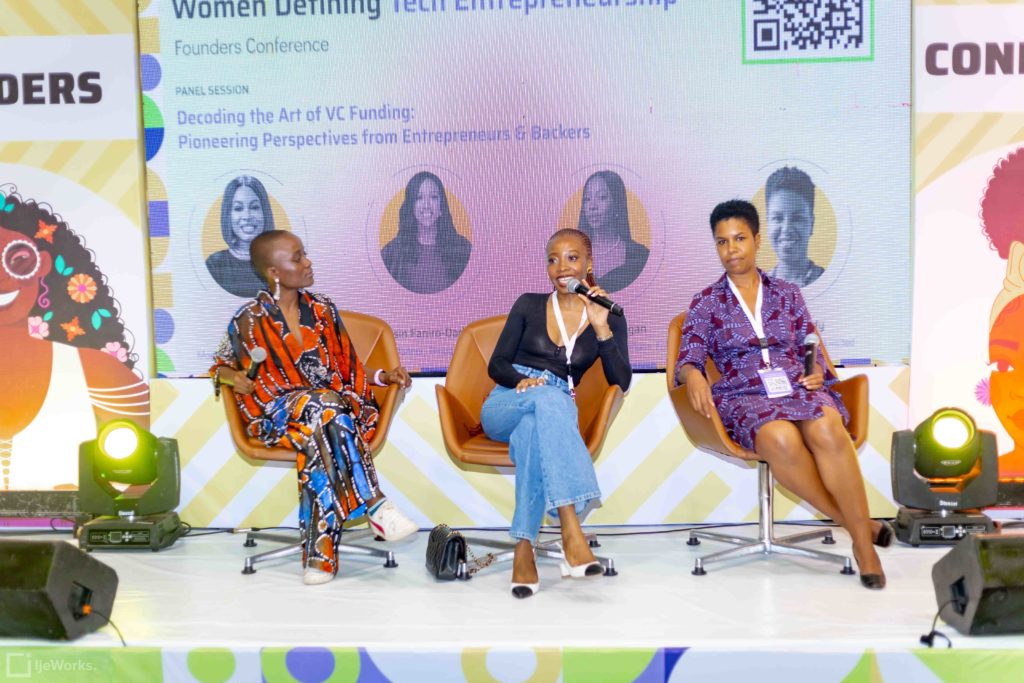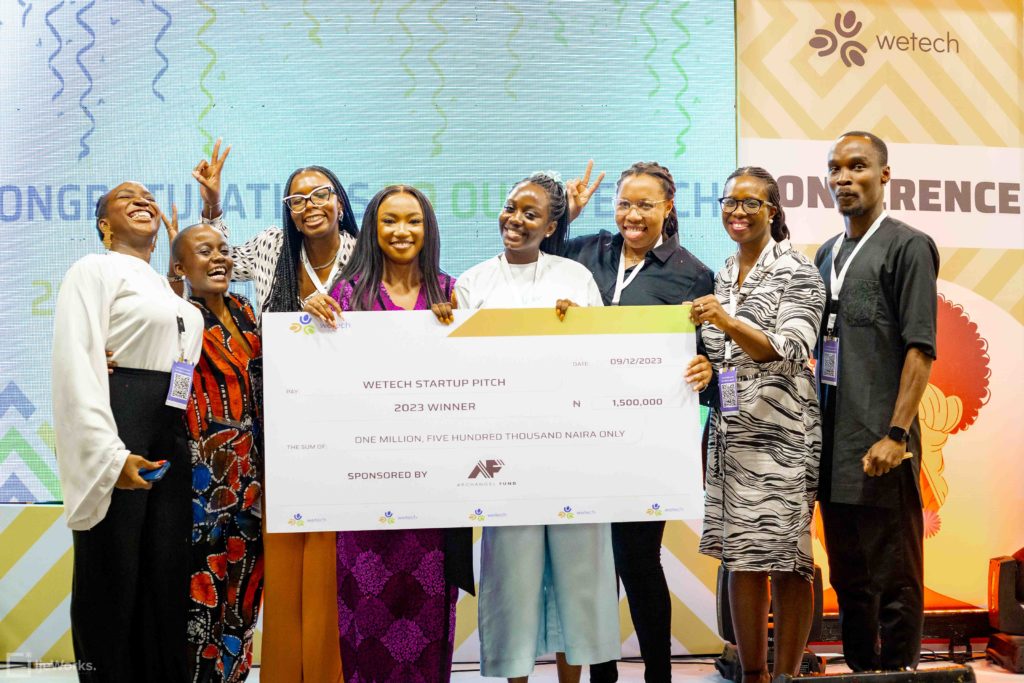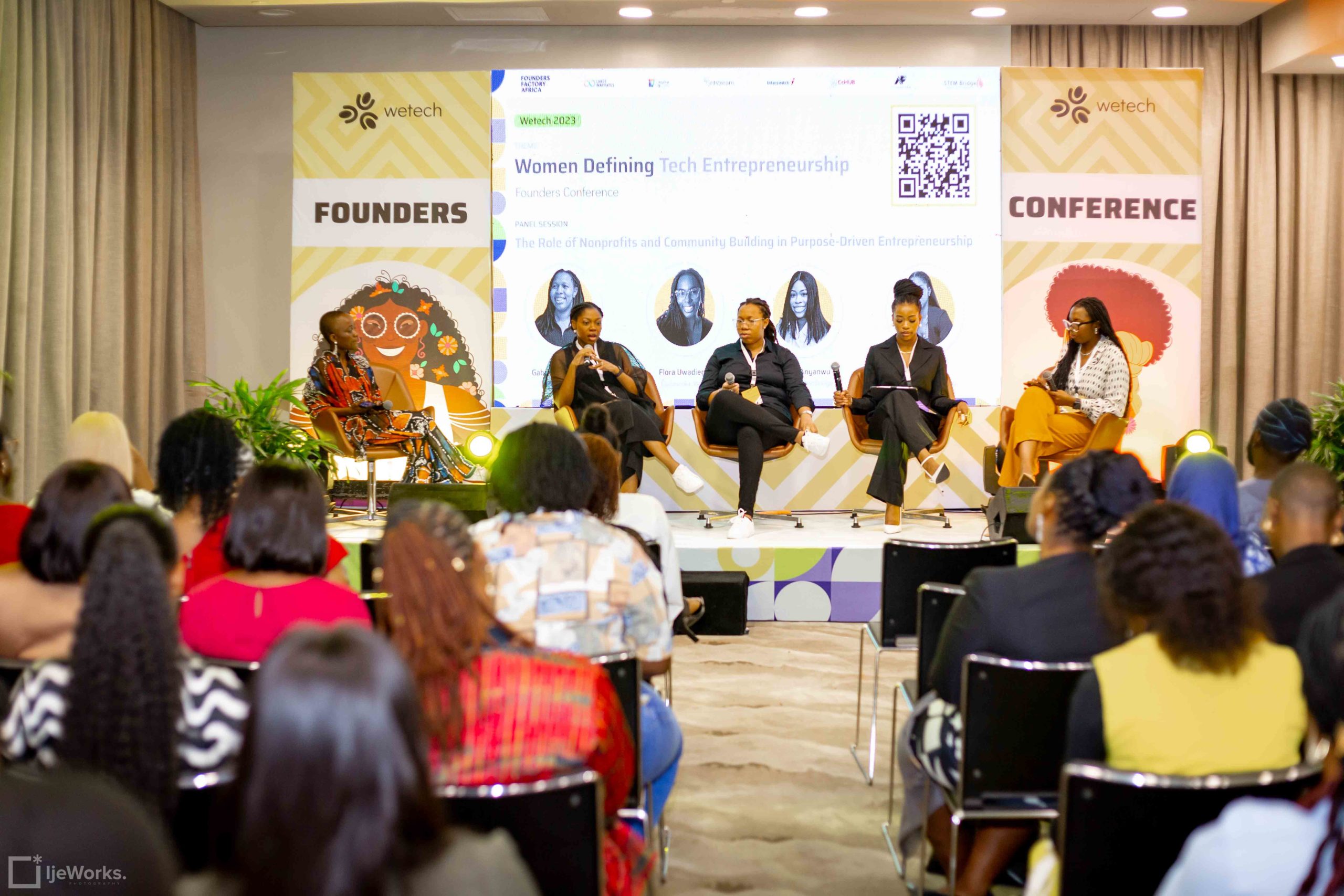On Saturday the 9th of December, Wetech hosted its first female founders conference. Since its inception in 2018, Wetech has been building a community of women dedicated to empowering and providing opportunities to other women. The goal of Wetech is to lower the entry barrier into tech and funnel more women into the industry by creating opportunities for networking, mentorship, and community building.
In Africa, the participation of women in the tech industry is below par and women still face significant gender barriers entering into tech. Less than 15% of tech start-ups have at least one female co-founder and only 10% have a woman CEO. Women-led startups are less likely to be funded and according to one report, only 3% of venture capital funding in Africa goes to startups with a female CEO.
Wetech hosts an annual conference for women in tech to further its goals. This large gathering of women come together to discuss the tech industry and how to improve the participation of women in the industry. This year’s conference was its first female founders conference. It was focused on “Women Defining Tech Entrepreneurship” and was graced by female founders, venture investors, female tech leaders, and women in the tech industry.
This inaugural female founders conference was held at the Four Points by Sheraton Hotel in Lagos. The event was opened by Koromone Asabe-Yobaere, co-founder and chief brand officer at Jamit, who gave the welcome note and moderated the first panel on “The Role of Nonprofits and Community Building in Purpose Driven Entrepreneurship”. Discussions on this panel were held between Flora Uwadiegwu and Gabriella Uwadiegwu, co-founders of Wetech. It also included Kaosi Anyanwu, software engineer at Microsoft and Nsikan Ubi, CEO of NUBI Consulting. On this first panel the speakers discussed how nonprofits can become self sustainable and support social entrepreneurship.
This first panel was followed by breakout sessions with panellists discussing topics including “Tech for Good: Women Steering Impactful Ventures”, “Demystifying the Startup Evaluation: Insights from Investors”, “The Mind Matters: The Hidden Cost of Burnout and Recovery Strategies for Founders”, and “The Role of Female-Led Innovation in Edtech”. The final panel of the day was on “Scaling Up: Growth Strategies for Female-Led Tech Startups”.

Speaking on their experiences on investing and funding-raising were Kenechi Eze, an investment analyst; Oluwadunni Fanibe, Program Manager at Techstars; and Gabriella who is also a founding partner at Archangel Fund, in the session “Demystifying Startup Evaluation: Insights from the Investor’s Lens,” On the subject of due diligence and differentiating between a hype and true innovation, Gabriella stated that her years of operating experience in varied industries and cultures gives her knowledge in a lot of areas. With experience comes knowledge and discernment. She also spoke about the responsibility of investors to seek out expertise in areas where they lack expertise. According to Oluwadunni her criteria for evaluating startups includes looking out for founders who show in-depth knowledge of the market/industry, founders who show grit and resilience, and teams with great synergy. She also stressed the importance of keeping one’s investors updated to mitigate against worsening problems.
The panel, titled “Scaling Up: Growth Strategies for Female-Led Tech Startups,” witnessed discussions from Kate Victory-Oedema, growth marketer, Founders Factory Africa; Uju Uzo-Ojinnaka, founder/CEO at Traders of Africa (TOFA); and Sylvester Kay-Adade, LP relations, Ingressive Capital. The question of how to pitch for partnerships and collaborations in the early stages came up and Kate advised founders to start thinking of partnership from the very beginning. She emphasised the importance of value creation, advising that once founders decide on the solution they want to build, they should also consider what value they can offer others and vice versa. This helps founders determine who to seek partnerships with and how to evaluate what they can bring to the table. Drawing from her experience advising startups, she spoke about identifying core channels to gain traction with users for your startup and identifying these core channels by experimenting and iterating as they go. Sylvester emphasised the importance of delegating to speed-up growth.
On the panel titled “Decoding the Art of VC Funding: Pioneering Perspectives from Entrepreneurs and Backers,” Dolapo Morgan, Investor, Ventures Platform Fund, and Miishe Addy, Co-Founder and CEO, of Jetstream Africa, delved into the topic of venture capital and fund seeking. Dolapo gave pitching tips emphasising the need to show some form of traction like revenue or users to potential investors. Asked what signs she looks out for that tell her a startup has potential to scale or not meet its goal, Dolapo stated that for her and team, the cost of acquiring a new customer overtime is the biggest metric. They look out for businesses, products, or solutions that the cost of acquiring a new customer over time can become zero or close to zero. Market-creating innovations are considered more favourably to investors and these are solutions built for previously underserved markets where you can be the first or only solution in the market or you are building solutions in a new way. Drawing from her experience leading the investment team at Ventures Platform she has learnt that being able to sell yourself, showing confidence, knowing details of your business and industry and great presentation are good tips for women to improve their chances of funding. Sharing her experiences around rejection and failure, Miishe Addy talked about the lessons in rejection. According to her, in negative feedback lies insights about your business and also opportunities for your business.
The speakers at the conference also discussed how early-stage startups can handle legal complexities. They spoke about the challenges faced by female founders and how to overcome these challenges. They also discussed how to balance mental health and work.
Other speakers at the event included Nissi Madu, managing partner at CcHub; Kristin Wilson, venture partner at Oui Capital and CSO at Spurt; Ifeoma Nwobu, co-founder and COO at Sendstack; and a host of other prestigious leading female entrepreneurs.

The event closed with the PitchHer competition for startup founders to sell their ideas to a panel of judges and stand a chance to win ₦1.5m. Three-minute pitches were presented by Lawretta Egba, CEO of Mustard Insights; Chinwe Udo-Davis, CEO and co-founder of Instollar, Dr Kieva Chris-Amusan CEO of Fertitude, Rhoda Orovwiroro co-founder of Helgg, and Morayo Ojikutu, CEO of Flow. The winning pitch was from Morayo Ojikutu who introduced Flow—a learning platform for children— to the audience and bagged her organisation ₦1.5million. The PitchHer competition this year was sponsored by Archangel Fund which invests in technology-based startups.
Next year, Wetech will be celebrating “5 Years of Women Redefining Technology and Entrepreneurship” on September 20–21, 2024. The vision is to expand the conference adding interactive workshops and career fairs.
Connect with Wetech here for more information.















